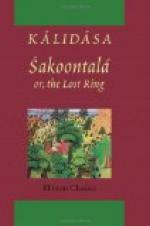The venerable matron has given utterance to the very wish that was in my mind.
KA[S’]YAPA.
His penances have gained for him the faculty of omniscience, and the whole scene is already present to his mind’s eye.
KING.
Then most assuredly he cannot be very angry with me.
KA[S’]YAPA.
Nevertheless, it becomes us to send him intelligence of this happy event, and hear his reply. What ho there!
PUPIL. [Entering.
Holy father, what are your commands?
KA[S’]YAPA.
My good Galava, delay not an instant, but hasten through the air and convey to the venerable Kanwa, from me, the happy news that the fatal spell has ceased, that Dushyanta’s memory is restored, that his daughter [S’]akoontala has a son, and that she is once more tenderly acknowledged by her husband.
PUPIL.
Your Highness’ commands shall be obeyed.
[Exit.
KA[S’]YAPA.
And now, my dear son, take thy consort and thy child, re-ascend the car of Indra, and return to thy imperial capital.
KING.
Most holy father, I obey.
KA[S’]YAPA.
And accept this blessing—
For countless ages may the god of gods,
Lord of the atmosphere, by copious showers
Secure abundant harvests to thy subjects;
And thou by frequent offerings preserve
The Thunderer’s friendship.
Thus, by interchange
Of kindly actions may you both confer
Unnumbered benefits on earth and heaven.
KING.
Holy father, I will strive, as far as I am able, to attain this happiness.
KA[S’]YAPA.
What other favour can I bestow on thee, my son?
KING.
What other can I desire? If, however, you permit me to form another wish, I would humbly beg that the saying of the sage Bharata[130] be fulfilled:
May kings reign only for their subjects’ weal;
May the divine Saraswati[131], the source
Of speech, and goddess of dramatic art,
Be ever honoured by the great and wise;
And may the purple self-existent god[132],
Whose vital Energy[133] pervades all space,
From future transmigrations save my soul.
[Exeunt omnes.
NOTES:
1. I[S’]a preserve you.
That is, ‘the Lord,’ a name given to the god Siva, when regarded as supreme. As presiding over dissolution he is associated with Brahma the Creator, and Vishnu the Preserver; constituting with them the Hindu Triad. Kalidasa indulges the religious predilections of his fellow-townsmen by beginning and ending the play with a prayer to [S’]iva, who had a large temple in Ujjayini, the modern Oujein, the city of Vikramaditya, situated north-eastward from Gujarat.




